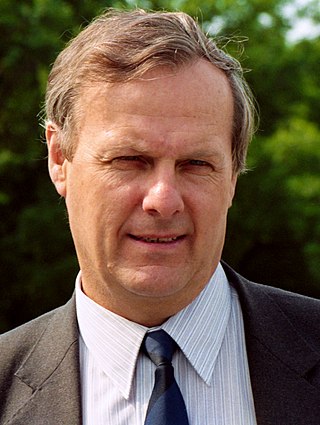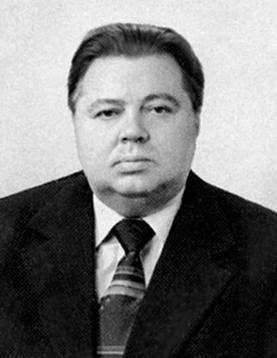
The All-Russian Political Party "United Russia" is the ruling political party of Russia. As the largest party in the Russian Federation, it holds 325 of the 450 seats in the State Duma as of 2022, having constituted the majority in the chamber since 2007.

Mikhail Yefimovich Fradkov is a Russian politician who served as Prime Minister of Russia from 2004 to 2007. An Independent, he was the longest serving director of Russia's Foreign Intelligence Service from 2007 to 2016. Since 4 January 2017, Fradkov has been Director of the Russian Institute for Strategic Studies.

Sergei Borisovich Ivanov is a Russian senior official and politician who has been serving as the Special Presidential Envoy on the Issues of Environmental Activities, Ecology and Transport since 12 August 2016. He has the federal state civilian service rank of 1st class Active State Councillor of the Russian Federation.

Nikolai Ivanovich Ryzhkov was a Russian politician. He served as the last chairman of the Council of Ministers of the Soviet Union from 1985 to 1991 and was succeeded by Valentin Pavlov as prime minister. The same year, he lost his seat on the Presidential Council, going on to become Boris Yeltsin's leading opponent in the 1991 presidential election of the Russian Soviet Federative Socialist Republic. He was the last surviving premier of the Soviet Union following the death of Ivan Silayev on 8 February 2023.

In September and October 1993, a constitutional crisis arose in the Russian Federation from a conflict between the then Russian president Boris Yeltsin and the country's parliament. Yeltsin performed a self-coup, dissolving parliament and instituting a presidential rule by decree system. The crisis ended with Yeltsin using military force to attack Moscow's House of Soviets and arrest the lawmakers. In Russia, the events are known as the "October Coup" or "Black October".
Russian oligarchs are business oligarchs of the former Soviet republics who rapidly accumulated wealth in the 1990s via the Russian privatisation that followed the dissolution of the Soviet Union. The failing Soviet state left the ownership of state assets contested, which allowed for informal deals with former USSR officials as a means to acquire state property.

The Federation Council, unofficially Senate, is the upper house of the Federal Assembly of Russia. It was established by the Constitution of the Russian Federation in 1993.

Anatoly Aleksandrovich Sobchak was a Russian politician, a co-author of the Constitution of the Russian Federation, and the first democratically elected mayor of Saint Petersburg.

The Ministry of Foreign Affairs of the Russian Federation is the central government institution charged with leading the foreign policy and foreign relations of Russia. It is a continuation of the Ministry of Foreign Affairs of the Russian Soviet Federative Socialist Republic, which was under the supervision of the Soviet Ministry of External Relations. Sergei Lavrov is the current foreign minister.

The Presidential Executive Office of Russia or the Presidential Administration of Russia is the executive office of the President of Russia created by a decree of Boris Yeltsin on 19 July 1991 as an institution supporting the activity of the president and the vice-president of Russian SFSR, as well as deliberative bodies attached to the president, including the Security Council.

Sergey Yevgenyevich Naryshkin is a Russian politician who has served as the director of the Foreign Intelligence Service since 2016. Previously, he was Chairman of the State Duma (2011–2016) and Kremlin Chief of Staff (2008–2012); he was also chairman of the Historical Truth Commission from May 2009 until it was dissolved in February 2012. Naryshkin has the federal state civilian service rank of 1st class Active State Councillor of the Russian Federation.

The Bishkek Protocol was a provisional ceasefire agreement, signed by the representatives of Armenia, Azerbaijan, the unrecognized Republic of Artsakh, and Russia on May 5, 1994, in Bishkek, the capital of Kyrgyzstan.
The Russia Forum was an annual event held in Moscow, hosted by Troika Dialog from 2008 to 2013. From 2012, The Russia Forum was jointly presented by Sberbank of Russia and Troika Dialog.

The first deputy premier of the Soviet Union was the deputy head of government of the Union of Soviet Socialist Republics (USSR). Despite the title, the office was not always held by a single individual. The office bore three different titles throughout its existence: First Deputy Chairman of the Council of People's Commissars (1923–1946), First Deputy Chairman of the Council of Ministers (1946–1991), and First Deputy Prime Minister of the Soviet Union (1991). The term "first deputy premier" was used by outside commentators to describe the office of first deputy head of government.

Lev Alekseyevich Voronin was a Soviet and Russian official. He served as a First Deputy Chairman of the Council of Ministers, literally the Vice-Premier of the Soviet Union, from 1989 to 1990. Responsible for the "general issues" of the cultural and economic administration of the Soviet Union during the late Gorbachev Era, Voronin became acting Chairman of the Council of Ministers in between Nikolai Ryzhkov's hospitalization and Valentin Pavlov's election as Prime Minister. Voronin worked as a banker following the dissolution of the Soviet Union.
The following lists events that happened during 1945 in the Union of Soviet Socialist Republics.

Alexander Nikolayevich Shokhin is a Russian state, political and public figure and a Member of the Bureau of the Supreme Council of the party United Russia. Minister of Labour of the RSFSR. On 20 January 1994 to 6 November 1994, Minister of the Russian economy, 23 March 1994 to 6 November 1994, Deputy Chairman of the Russian Government.
Vladimir Pavlovich Polevanov is a former Russian politician who served as a Deputy Chairman of Government of the Russian Federation during the administration of President Boris Yeltsin. He was also chairman of the State Property Committee and governor of the Amur Oblast.
This article contains the list of candidates associated with the 1996 Russian presidential election.
Gubernatorial elections in 1991 and 1992 took place in 11 federal subjects of Russia. Moscow, Saint Petersburg, Tatarstan, Kalmykia, Mari El, Mordovia, Sakha and Chuvashia held their first elections in 1991. In Adygea and Kabardino-Balkaria second tours were held after the New Year celebrations. Tuva was the only one region of the Russian Federation to held its first presidential election in 1992, ignoring the year-long moratorium introduced by Russian parliament in late 1991.














